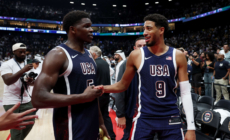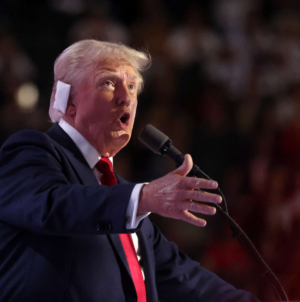-
Donald Trump’s Protester Comments Raise Key Issues - 17 mins ago
-
Dad arrested after 3-year-old son dies from gunshot to the head a year after daughter is fatally shot - 27 mins ago
-
Adam Duvall smashes a two-run home run to give Braves an early lead over Mets - 42 mins ago
-
How to Watch Men’s Basketball at the 2024 Paris Olympics: Streams, Schedule - 56 mins ago
-
Serial killer who wanted to be mafia hit man given life in prison after death sentence is overturned - about 1 hour ago
-
Justin Timberlake’s lawyer claims police made ‘significant errors’ during star’s DWI arrest - about 1 hour ago
-
Damages to college athletes range from few dollars to $1M-plus under settlement - about 1 hour ago
-
Kamala Harris Dealt Triple Swing State Polling Blow in One Week - 2 hours ago
-
Exciting AI tools and games you can try for free - 2 hours ago
-
‘Firenado’ spotted above explosive Park fire near Chico - 2 hours ago
There’s 32 Lesbian Bars Left in America. Here’s Where They Are
Femme seems, from the outset, just like any other suburban Massachusetts watering hole. There’s TVs, a row of barstools, a long bar and plenty of tables for patrons to enjoy a craft-made cocktail and a gluten-free flatbread.
Maire Geoghegan likes to go to Femme, outside Boston in the city of Worcester, for drinks and food with her friends and girlfriend. They especially enjoy the trivia and bingo nights.
But the main thing that sets Femme apart from other bars is its clientele.
Femme is one of only 32 lesbian bars left in the United States. It’s the only one currently serving New England.
“Being in Worcester, it’s not a discriminatory as other places, but it is nice to have a safe space where I know that I can hold my girlfriend’s hand and no one’s going to judge me,” Geoghegan said. “There’s other bars that I’ve gone to that I feel less safe.”
Where did all the lesbian bars go?
Lesbian bars have been on the decline since the 1980s, when they numbered around 200. In the aughts, Phoenix alone was home to nearly half a dozen. As of 2024, Boycott Bar is the only one left — not just in Phoenix, but in the entire state of Arizona.
In 2020, Erica Rose and Elina Street started a campaign to document all of the remaining lesbian bars in the country in response to their dwindling numbers.
Their brainchild, which they called the Lesbian Bar Project, launched as a way to financially support lesbian bars across the country at the start of the pandemic, when stay-at-home orders threatened to obliterate the hospitality industry. The two raised $117,000 from their 90-second YouTube video and another $150,000 after a short film in 2021, Rose told Newsweek in an interview.
“Before us, there wasn’t a centralized list to find all of the bars,” she said.
In 2022, to mark National Coming Out Day, the Lesbian Bar Project released an eponymous three-part docuseries on the Roku Channel, with each episode focusing on a different establishment. It went on to win an Emmy.
Since the project was first launched, a handful of new lesbian bars have popped up around the U.S., including Femme, The Lady’s Room in Largo, Fla., Mother in San Francisco, The Ruby Fruit in Los Angeles, and The Sports Bra in Portland, Ore.
“I think we definitely helped amplify the conversation and pinpoint a desire for it,” Rose said, adding that she didn’t want to take credit for the other bar owners’ work. “People have been trying to do this business for years.”
‘Not for the male gaze’
As Geoghegan put it, “lesbian bars are not for the male gaze.” These spaces are “built by the queer girlies for the queer girlies.”
While gay bars remain far more prominent throughout the country, Rose said they aren’t always inclusive to others in the LGBTQ+ community. But most lesbian bars, she said, don’t use “lesbian” as their main identifier, and also market themselves toward queer, intersex, nonbinary and transgender patrons.
“We deal with misogyny and violence and threats that make us want to maintain some exclusivity with who is welcomed into the spaces,” said Vic King Smith, the general manager of the Cubbyhole in New York City’s West Village. “It’s really important that lesbian bars hold space for everyone’s gender journey.”
King Smith said that today, white cis-gender gay men “have all of the privileges” that white straight men have.
“They’re not experiencing the same amount of oppression and marginalization as trans people and queer people that just look different,” King Smith said. “It can be hard to compete with men in their own spaces.”
That is why King Smith said lesbian bars “better represent” the space the community wants to see.
“Lesbian bars allow me to act myself without thinking twice about how the people around me around going to react,” said Maya Falb, a former college student who would visit Femme. “They allow me to meet members of my community I would not have connected with otherwise.”
Lesbian bars pride themselves on being a safe and welcoming space, King Smith said.
“There’s something just about queer celebration and being surrounded by people that look like you…and seeing examples of relationships,” Geoghegan said. “It’s nice to just be somewhere and be comfortable.”

Alexi Rosenfeld/Getty Images
For Falb, who uses she/they pronouns, Femme opened just in time for their senior year of college at nearby Clark University.
“It was the first lesbian bar to open in New England, and I was thrilled that it was in Worcester,” they said. “I had never been to a lesbian bar before, and I longed for a space where I could be fully myself.”
While Falb could walk a few blocks to Femme, they said other patrons would drive multiple hours just to be in a space that felt welcoming.
“Lesbian bars help to show individuals that they belong and should be allowed to take up space in the city or town they live in,” Falb said. “At the root of lesbian bars is the importance of community and the history that each space holds.”
‘Sister bars’
Across the country in Arizona, Audrey Corley is on a similar mission.
“It’s something I have to keep doing,” Corley, who runs Phoenix’s Boycott Bar, told Newsweek. “There’s a lot of people that don’t have the safe space to go to, to be who they are. I think that’s important to women.”
Lesbian bars often have programming and services that extend beyond the main business of slinging drinks. At Cubbyhole, King Smith said the bar has offered gallery walking tours, name change clinics, voter registration events and pop-up sex toy workshops.
In Portland, The Sports Bra is dedicated exclusively to women’s sports. The bar’s mission is to serve food and drinks while providing a supportive and empowering environment that promotes girls and women in sports and in the community, according to its website.
Dorothy, in the West Town neighborhood of Chicago, offers a variety of events in addition to its unique cocktails. Last weekend, the bar put on a dance party based around Kleztronica, a form of techno music that samples from Yiddish folk music. There are silent book club nights, monthly open mics and a panel focused on spirituality and queerness that meets end of each month.
The Scarlet Fox in San Francisco is a wine bar that also hosts private events for graduations, birthdays, weddings and fundraisers. Customers can come for a sip and leave with a bottle or two for home.
Corley said places like Boycott and its “sister bars” have diligently worked to create a specific environment that’s at risk of disappearing, leaving a community of often marginalized people without a space of their own.
“They’re not just bars. We’re really not. We’re so much more than that,” Corley said. “We’re a family for people that don’t have family. We’re a space where people can be who they want to be, and that’s huge.”
Do you have a story we should be covering? Contact LiveNews@newsweek.com
Uncommon Knowledge
Newsweek is committed to challenging conventional wisdom and finding connections in the search for common ground.
Newsweek is committed to challenging conventional wisdom and finding connections in the search for common ground.
Source link
























